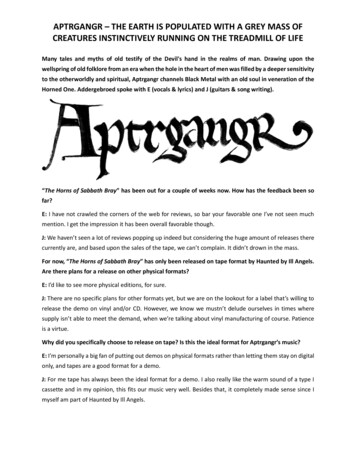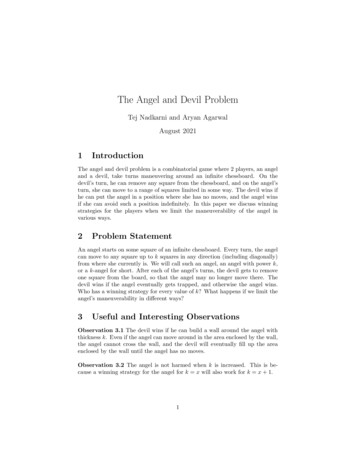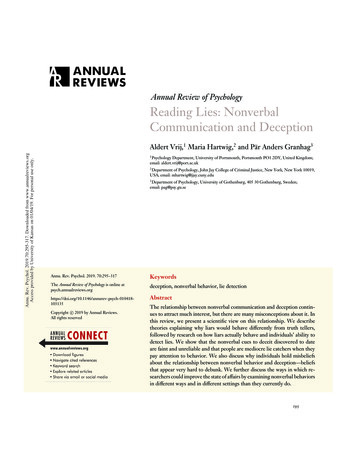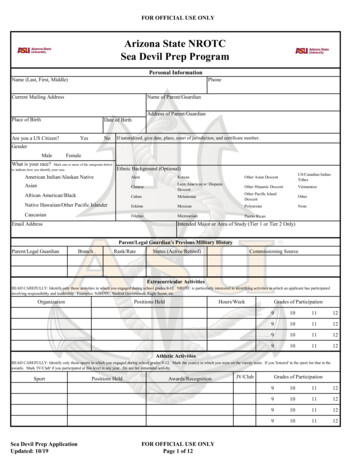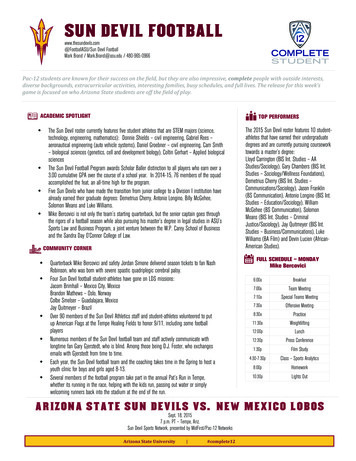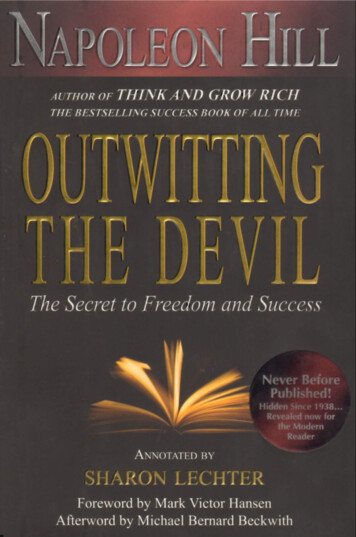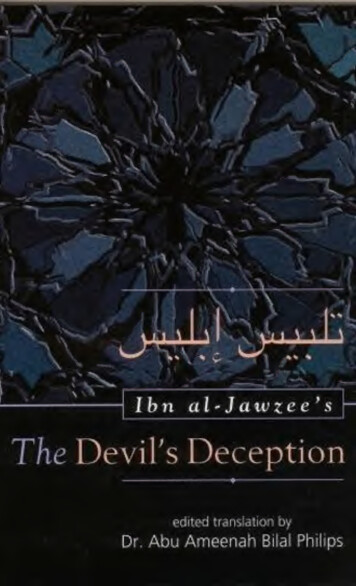
Transcription
The Devil's Deceptionedited tran ralionDr. Abu Ameenah Bilal Philips
Ibn al-Jawzee’sTheDevil’sDeceptionEdited TranslationbyDr. Abu Ameenah Bilal Philips
TABLE OF CONTENTSTransliteration.4Introduction to the Second Edition.6Translator’s Foreword.8Author’s Biography.11Author’s Introduction.13Adherence to the Sunnah and Jamaa‘ah.16The Sunnah and Bid‘ah.21The Devil’s Deception of the Khaarijites.24The Devil’s Deception of the Shee‘ah.39The Devil’s Deception of the Baatineeyah.52Bilbliography71
TRANSLITERATIONIn order to provide the non-Arab with a more accurate set ofsymbols than those in current use, I have adopted a somewhat inno vative system of transliteration. However, no transliteration can ex press exactly the vocalic differences between two languages norCcin Roman characters give anything more than an approximate soundof the original Arabic words and phrases. There is another difficultyin romanizing certain combinations of Arabic words which are pro nounced differently from the written characters. Included in thiscategory is the prefix “a/” (representing the article “the”) when itprecedes words beginning with letters known as al-Huroof ashShamseeyah (literally ‘sun letters’), the sound of “1” is merged intothe following letter; for example, al-Rahmaan is pronounced arRahmaan. Whereas in the case of all other letters known as al-Huroofal-Qamareeyah (literally ‘moon letters’), the “a/” is pronouncedfully. I have followed the pronunciation for the facility of the aver age reader by writing ar-Rahmaan instead of al-Rahmaan and soon.Consonants. 1 d1b1tih Iith1i jttchJt ikhJdghfkih\j1mj**jZr0 s0h1shJw1s111in1y41
Vowelsa.t".3t. ui.aa00.ec:The system adopted in the book as as follows:Shaddah ( ) - The shaddah is represented in Roman letters by dou bled consonants. However, in actual pronunciation the letters shouldbe merged and held briefly like the “n” sound produced by the “n”and “kn” combination in the word unknown or like the “n” in un natural and unnecessary. 1 have made an exception with {iS ) in stead of iyy, I have used eey as in islaameeyah, because this moreaccurately conveys the sound in English.5
INTRODUCTION TO THE SECOND EDITIONThe first edition of this book published under the title TheDeviTs Deception of the Shee 'ah has been out of print for more thanfive years. It was published in 1985 along with Plural Marriage inIslaam which has since been reprinted more than four times. I didnot reprint The DeviTs Deception because the Shiite propagandathreat to new-Muslims in the West has been significantly reduced.The main cause of that reduction is the recent publication of a numberof good books in English which clearly explain the Islamic creed.However, Shiite missionary work has again intensified among Eng lish-speaking Muslim communities around the world that are igno rant of the history of Shiites and tenets of their creed. Spear-head ing this attack is Tahrike Tarsile Qur'an, Inc., in Elmhurst, NewYork. This publishing company reprints popular translations of theQur’aan by Pickthall and Yusuf Ali to gain credibility among theinnocent masses. They also publish M.H. Shakir’s Shiite transla tion called, Holy Qur'an, along with a variety of anti-Islamic tractslike. And Then I was Guided, The Right Path, etc. A major offen sive has been launched against indigenous Muslim communities inPhilippines, Sri Lanka, and Liberia. Their materials are creatingdoubts in the minds of young Muslims anxious for the return ofIslaam in their various countries. Consequently, a number of Is lamic institutions, organizations, individuals and book publishershave impressed on me the need for a reprint of the Devil's Decep tion on numerous occasions over the past five years.Another translated work on Shi‘ism which I did called Mi rage in Iran was reprinted a couple of years ago, without any revi sion, by Abul Qasim Bookstore in Jeddah, Saudi Arabia. However,this translation of The DeviTs Deception has been revised and im proved in order to increase its benefit to the readers. One of theunique aspects of the original translation of the DeviTs Deceptionof the Shee'ah is the extensive footnotes which I added to increasethe historical content and relevance of the work. Though these foot-6
notes are rather cumbersome and at times more than the text itself,they do provide essential background information for the averagereader. Consequently, I have kept them, but I have tried to improvethe layout to make reading them easier.It should also be stated that the differences between Islaamand Shi‘ism are not only legal and political, but they touch the fun damental principles of faith. The essential difference between trueIslaam and Shi‘ism lies in the concept of God and man’s relation ship to God. True Islaam holds that God’s attributes are unique toHim alone, while Shi‘ism has given some of God’s attributes tohuman beings whom they have titled ‘Imaams’. For Shi‘ites theImaams are intermediaries between man and God, and without theirintercession humans are lost. As the religion of Islaam brought byProphet Jesus was changed by men into another religion which theynamed ‘Christianity’, the final revelation of Islaam brought by thelast Prophet, Muhammad ( ), has been changed by men into an other religion which they called ‘Shi‘ism’.Dr. Abu Ameenah Bilal Philips7
TRANSLATOR’S FOREWORDSince the Iranian “Revolution” of 1978, there has been a con certed effort to spread the Shee‘ah doctrine by force of arms in theArab world and by propagation and political influence elsewhere especially in the West. Shi‘ite activity in the West has not been di rected at non-Muslims to convert them to Shiism, but has beendirected specifically at Muslims ignorant of Islaam but enthralledby the thought of Islamic revolution. Consequently, the brunt ofShiite propaganda has fallen on new-Muslim communities in theAmericas where the majority of Muslims are in the formative yearsof their Islaam. These communities have been flooded with freeliterature in English filled with historical distortions, lies, and inno vations, and many new-Muslims have been given expense paidguided tours of Iran and exposed to the ‘fruits of the revolution’.In the Muslim world a number of refutations of the Shi‘itebeliefs have been made by early scholars, and Shi‘ite deviationsfrom the mainstream are well known. Also a number of books andpamphlets have been written recently in rebuttal to the Shi‘ite’sdeceptive call to mend the rift between Sunni and Shee‘ah. How ever, due to the extreme scarcity of material in English concerningthe history of Shi ‘ites and their creed, little or no comparison can bemade by new-Muslims. They are subsequently overwhelmed by theIranian propaganda onslaught in which many of the more deviantbeliefs have been cleverly disguised. Hence there is a dire need forthe translation of authoritative classical works on the Shee‘ah. Al though classical works written in polemic style tend to alienate read ers who are uncommitted to either side of the controversy, suchworks often contain a wealth of important information.The work at hand represents an abridged translation of theintroduction and four chapters from Ibn al-Jawzee’s classic, TalbeesIblees/ which deals with the Devil’s deception of some Muslim' Literally ‘Talbees” means deception. Iblees, the personal name of the Devil isderived, according to Arab philologists, from the root “balasa” because Iblees hasnothing to expect (ublisa) from the mercy of God.8
scholars, mystics and philosophers as well as deviant psuedo-Islamic sects. Three of the sections concern the birth and develop ment of the sects known collectively as the Khawaarij (Khaarijites),the Shee‘ah (Shia or Shi‘ites) and the Baatineeyah. The first twoare the first deviations from mainstream Islaam, and the third is anoffshoot of the Shee‘ah.Any comprehensive study of Shi‘ism has to include theKhawaarij, because to a large degree the Shiite deviation repre sents an extreme reaction to the extremes of the Khawaarij. TheKhawaarij declared ‘Alee ibn Abee Taalib to be a Coffer (disbe liever) and the Shi‘ite elevated him and some of his descendants tothe leval of demi-gods. Meanwhile mainstream Islaam, often re ferred to as Sunni Islaam, considers him to be neither a coffer nor ademi-god, but one of the greatest companions of the Prophet ( ) ,and the fourth of the Righteous Caliphs. No serious historical studyof the Shee‘ah could be considered complete without a look at whatit gave birth to, the ultra-deviant sects of the Baatineeyah.In the sects of the Baatineeyah, the ideas and philosophy ofShi‘ism were projected to their inevitable conclusion, in which ‘Aleeibn Abee Taalib and some of his descendants became manifesta tions of God on earth. The Christian belief that Prophet Jesus wasGod incarnate, in an even more detestable form, became part of thebelief of a people who called themselves Muslims just as the Prophet( ) had predicted, ''You will follow the ways of the nations beforeyou inch by inch and foot by foot to such a degree that if they en tered a lizard*s hole, you would go in after them'' When he wasasked if by former nations he meant the Christians and the Jews, hereplied, "Who else could it beT The Arabic phrase “Sal-lallaahu‘alayhi wa Sallam” (may Allaah’s peace and bless ings be upon him), is a prayer which all Muslims are enjoined to say whenever theProphet’s name is mentioned. Reported by Abu Sa‘eed and collected by al-Bukhaaree and Muslim.9
In closing, it should be noted that all of the footnotes in thetext are mine. Footnotes were added to identify the sources of thehadeeths mentioned by the author and to indicate their degree ofauthenticity where necessary. Extensive footnotes were also addedto clarify the background of many of the historical references givenby the author.1 hope that this work will be of benefit to all who read it andpray that Allaah accepts it as a good deed done purely for His pleas ure.Abu Ameenah Bilal PhilipsMarch 15, 198510
AUTHOR’S BIOGRAPHY‘Abdur-Rahmaan ibn ‘Alee ibn Ja‘far al-Jawzee was bom inthe city of Baghdad in approximately 1114 CE and grew up study ing under the leading scholars of his time, including his uncle,Muhammad ibn Naasir al-Baghdaadee, a scholar of Hadeeth, Fiqhand Arabic grammar.Ibn al-Jawzee became an outstanding scholar of the twelfthcentury especially in the Hadeeth sciences for which he was titled''Al-HaafitF\ He also was noted for his scholarship in the fields ofHistory, Linguistics, Tafseer and Fiqh. In fact, he became the lead ing scholar of the Hambalee Madh-hab of his time and played avery important role in reviving and spreading it, especially afterbecoming a favorite of the ‘Abbaasid Caliph, al-Mustad‘ee (11421180 CE), In the year 1179, he had five schools in the capital inwhich he used to lecture. However, his enthusiasm for his Madhhab created ill-feeling and jealousies among the other scholars.During the reign of al-Mustad‘ee’s son. Caliph an-Naasir Lideenillaah (1159-1225 CE), he was banished to Wasit, where he remainedfor five years. In the year 1199, he was released and returned toBaghdad, where he died two years later." Ibn al-Jawzee lived to theripe old age of 87 and was a prolific writer throughout most of hislife. Recently, Professor ‘Abdul-Hameed al-‘Aloojee, an Iraqischolar conducted research on the extant writings of Ibn al-Jawzeeand wrote a reference work in which he listed Ibn al-Jawzee’s worksalphabetically, identifying the publishers and libraries where hisunpublished manuscripts could be found. The number of Ibn-alJawzee’s books reached a staggering total of three hundred and sev enty-six texts. However, even this large number cannot be consid ered surprising given Ibn al-Jawzee’s high regard for time. He wasreported to have said, “Many people used to pay me social visitsIbn al-Jawzee, al-Misbaah al-Mudee fee Khilaafah al-Mustadee, (Baghdad,Awqaaf Press, 1976) vol. 1, pp.37-39.11
and I likewise until I realized that time is a most noble and preciousthing, and hence began to dislike visiting. However, I became caughtbetween two possibilities; if I refused their visits, I would ultimatelyfeeling lonely and miss something which I had grown accustomedto, but if I accepted their visits, my time would be wasted. Conse quently, I began to avoid visits to the best of my ability and if itbecame unavoidable, I would limit my conversation in order to has ten the visit’s end. I also prepared work to do during my visits sothat no time would pass idly by.”Among the most famous of Ibn al-Jawzee’s works in the fieldof sectarianism is Talbees Iblees, from which this abridged transla tion of four of its chapters was made. In the field of biography ofthe Sahaabah’s and the early generation of scholars is his book,Sifah as-Safwahy which consists of three large volumes and Tareekh'Umar ibn al-Khattaab, (Beirut: Daar ar-Raaidal-‘Arabee, 1982).His book, Taqweemal-Lisaan, (first edition, Cairo: Daar al-Ma‘rifah,1066), was written in the field of Arabic Linguistics. In the field ofscience of Tafseer, Ibn al-Jawzee wrote a nine volume work entitledZaad al-Maseer fee 'Urn at-Tafseer, (Damascus: al- Maktabah alIslaameeyah, 1964), and in Hadeeth al-'Ilal al-Mutanaahiyah feeal-Ahaadeeth al-Waahiyah,(first edition, Faisalabad, PakistanIdaarah al-‘Uloom al-Athareeyah, 1979) and Al-Mawdoo'aat,(Madeenah, Saudi Arabia: Al-Maktabah as-Salafeeyah, 1966), whichconsists of three volumes.12
AUTHOR’S INTRODUCTIONAll praise is due to Allaah, Who only gives the criterion ofjustice to the most pious among scholars and intellectuals. It is HeWho sent messengers bearing glad tidings of reward and warningsof punishment and He also revealed to them divine books contain ing perfect laws free from any deficiency, blemish, or fault, whichexplained the wrong and the right.I praise Him as one who knows that He is the causer of allcauses praises Him, and I sincerely testify to His oneness without atrace of doubt. I also bear witness that Muhammad is His slave andmessenger whom He sent when disbelief hung like a veil on theface of belief. He removed the darkness with the light of divineguidance, lifted the curtains of ignorance and explained to the peo ple what was revealed for them. He clarified all which was unclearin the Qur’aan and left Muslims in a clear state, free from anydistortion. May Allaah’s peace and blessings be on him, on all ofhis family and companions, and on all those who righteously fol low in their footsteps until the day of resurrection and judgement.Surely the greatest God given blessing to humankind is theintellect, because it is the sole instrument by which God, Most Glo rious, is known, and the only way by which belief in the Prophet isrealized. However since the intellect can’t take responsibility foreverything humankind requires, messengers were sent and divinebooks were revealed. That is, the divine law is like the sun and theintellect like the eye which sees the sun, if the eye is open and healthy.When the true message of the prophets is accepted by the intellectafter exposure to miraculous proofs, it submits to the prophets anddepends on them for understanding the hidden and unseen world.After blessing the world of man with intellect, Allaah beganhumankind’s earthly existence with the prophethood of Aadam,peace be on him, who taught his descendants according to divinerevelation. Humankind remained on the right path until Cain sepa rated himself from the path of righteousness by following his de-13
sires and killing his brother. Subsequently, uncontrolled desires splitpeople into factions and drove them into the wilderness ofmisguidance and the worship of idols. Many contradictory beliefsand practices which were incompatible with the message of theProphets and confusing to the intellect arose among them. By fol lowing their desires, customs, and the influence of their leaders,people confirmed the Devil’s wish; that they would all follow himexcept a handful of believers. It should be realized that the prophets brought a crystal clearmessage which they successfully used to confront, the illnesses ofsociety and to effectively cure them according to a common meth odology.However, Satan came and introduced ambiguities into theclear message, mixed poison with the cures, and obscured the straightpath by creating around it countless deviant paths. Down throughthe ages Satan continued to play with people’s minds until they frag mented into a multitude of absurd denominations and sects basedon despicable innovations. Some eventually worshipped idols inand around the very Ka‘bah, the first house of worship built for theworship of the One God, Allaah. The Arabs made certain animalsforbidden to themselves like the Saa‘ibah, a she-camel left to grazefreely; the Baheerah, a Saa‘ibah’s female offspring whose ear theyused to slit; the Waseelah, a sheep which had given birth seven timeseach time delivering twin females; and the Haamm, a stallion-cameldedicated to the gods according to certain rites. They also buriedtheir baby daughters alive, and deprived orphans of their rightfulinheritance etc.Allaah then sent Muhammad, may Allaah’s peace and bless ings be on him who cancelled these detestable practices and intro duced laws for the benefit of mankind. As for his companions, theytravelled by the light of his guidance, during his lifetime and afterhis death, safe from the Devil and his enticements. But when the Soorah al-Hijir 15: 39-4014
daylight of their presence faded and the shadows of darkness fell,desires returned, innovations arose and the clear wide path becamenarrow. Most people split their religion into factions and the Devilrose to the occasion, obscuring, deceiving, embellishing, dividingand fabricating. For, the Devil’s deception can only take place inthe dark night of ignorance. If the dawn of knowledge rises his de ception is easily exposed.I decided to warn people about Satan’s cunning strategies bypointing out his traps because the exposure of evil is a warningagainst falling into it. In the Saheeh/ of aUBukhaaree and Muslimthere is a Hadeeth related by Hudhayfah in which he said. “Peopleused to ask Allaah’s Messenger about the good but I used to ask himabout the evil for fear of it catching hold of me.” ‘Abdullaah ibn‘Abbaas was also reported as saying, “By Allaah, I do not believethere is any one on earth today whom the Devil would like to seedead more than me.” When he was asked why that was so, he re plied, “By Allaah, when the Devil makes an innovation in the Westor the East and a man carries it to me I counter it with a Sunnah andit returns to him as he sent it.”Consequently, I wrote this book to warn people against thetrials of the Devil. I sought to frighten them by removing the Dev il’s mask and by exposing his evil tactics. And, Allaah helps every one who is truthful and whose intentions are wholly sincere. Authentic collections of prophetic traditions. Collected by al-Bukhaaree.15
ADHERENCE TO THE SUNNAH AND JAMAA’AH'Umar reported that on one occasion Allaah’s Messenger ( )stood up among them and said, “Whoever among you desires thecentre of paradise should keep close to the Jamaa'ah (community)for the Devil closely accompanies the solitary individual and is moredistant from two.” ‘Abdullaah reported that on one occasion Allaah’s Messengerdrew a line in the dust with his hand and said, 'This is the straightpath of Allaah.” Then he drew a series of lines to the right and to theleft of it and said, “Each of these paths has a devil at its head invit ing people to it.” He then recited, “Verily this is my straight path so9follow it and do not follow the (twisted) paths. ”10‘Abdullaah ibn ’ Amr reported that Allaah’s Messenger ( )said, “What happened to the children of Israel will surely happen tomy nation, step by step. So much so that if there are those whoopenly have sex with their mothers, among them there will be amongmy nation those who do that. Surely the Israelites splintered intoseventy-two sects and my nation will splinter into seventy-threesects, all of which will be in the fire except one.” When the(Sahaabah) asked “Which sect is it, O Messenger of Allaah?” Hereplied, “The one followed by my companions and myself.”"‘Aa’ishah reported that the Prophet ( ) said, “Whoever doessomething not approved by us will have it rejected.*2 Collected by at-Tirmithee and declared authentic by al-Albaanee in SaheehSunanat-Tirmithee (no. 1758). Soorah al-An‘aam 6:163' Collected by Ibn Maajah, authenticated by al-Albaanee in Saheeh Sunan IbnMaajah{\lll\\). 'Collected by at-Tirmithee and authenticated by al-Albaanee in Saheeh Sunan atTirmithee (no: 2129).' Collected by al-Bukhaaree (English trans. 3/535-6/861), and Muslim (Englishtrans. 3/931/4266).16
Anas ibn Maalik reported that the Prophet ( ) said, “Who ever dislikes my Sunnah is not a true follower,” ‘Abdur-Rahmaan ibn ‘Amr as-Salami said that he heard‘Irbaad ibn Saariyah saying, “Allaah’s Messenger ( ) delivered asermon to us whereby the eyes welled forth tears and the heartswere softened. We said, “Allaah’s Messenger, this is a sermon of aperson bidding farewell! So what do you enjoin upon us?” He said,“I am leaving you on brightness; its night is (as bright) as its day.None would deviate from it except the one who is doomed to per ish. Whosoever survives would see many differences. Then it wouldbe incumbant upon you to adhere to my sunnah and the sunnah ofthe righteous and pious caliphs, with which yo are familiar. Holdfast to it with your teeth and obedience (to the ruler) is obligatoryupon you even if he be an Abyssinian slave. Verily, the (true) be liever is like a camel having a (pricking) bridle in its nose. To which ever direction it is driven, it surrenders in submission.Ibn Mas‘ood reported that Allaah’s Messenger ( ) said, “Iwill lead you to the pond (in paradise), and some men will trembleand fall away from me. I will call out, ‘O Lord, they are my follow ers!’ So it will be said, ‘You do not know what they invented afteryour passing.’”*5Aboo Dardaa reported that Allaah’s Messenger ( ) cameforth to us while we were sitting making mention of destitution,“Do you fear destitution? By Allaah, in Whose Hands is my life,(the riches of) the world will be poured upon you abundantly, tillCollected by al-Bukhaaree (English trans. 7/1-2/1), and Muslim (English trans.2/703-4/3236).Collected by Ibn Maajah, authenticated by al-Albaanee in Saheeh Sunan IbnMaajah(]/\3-4/4\)' Collected by al-Bukhaaree (English trans. 8/378-9/578), and Muslim (Englishtrans. 4/1238/5690).17
nothing but this (world) will cause the heart of anyone of you todeviate (from the truth). By Allaah, I am leaving you (after me)with something like brightness, its night and its day are alike.” AbooDardaa said, “By Allaah, Allaah’s Messenger ( ) left us on (a path)like brightness.”' Al-Miqdaam ibn Ma’dikarib al-Kindi reported Allaah’s Mes senger ( ) as saying, “Very soon a tradition of mine will be relatedto person lying on his couch who will say, ‘The Book of Allaah (theQur’aan) is (enough) between you and us. Whatever we find in itas halaal (lawful), we accept it as halaal and whatever we find in itd&'haraam (unlawful), we take that as haraam.’ Behold, whateverAllaah’ Messenger ( ) has declared as haraam is just like thatwhich Allaah has declared as haraam.” ' ‘Abdullaah ibn Mas‘ood reported on the authority of his fa ther, that Allaah’s Messenger ( ) said, “He who deliberately at tributes a lie to me, let him take his seat in the Hell-Fire.”' Al-Munthir ibn Jareer reported on the authority of his fatherthat Allaah’s Messenger ( ) said, “If anyone introduces a goodtradition that is followed, he has a reward for that and the rewardequivalent to the reward of those who follow it without anydimunition in their own rewards; and if anyone introduces an eviltradition that is followed, its burden as well as the burden of thosewho act upon it, will lie upon him without any dimunition in theirown burdens.”Collected by Ibn Maajah and authenticated by al-Albaanee in aheeh Sunan IbnMaajah (1/6/5).' Collected by Ibn Maajah and authenticated by al-Albaanee in aheeh Sunan IbnMaajah (1/1/12).Collected by Ibn Maajah and authenticated by al-Albaanee in aheeh Sunan IbnMaajah (mm%).' Collected by Ibn Maajah and authenticated by al-Albaanee in Sa/ieeh Sunan IbnMaajah (1/40/168).18
‘Amr ibn ‘Awf al-Muzanee reported that the Allaah’s Mes senger ( ) said, “He who revived a sunnaih of mine, then peopleacted upon it, would earn (a reward) similar to the reward of onewho acted according to it; nothing would be deducted from his reward.” ‘Abul-‘Aaliyah * reported that the Sahaabee, Llbayy ibn Ka‘bsaid, “Adhere to God’s path and cling to the Sunnah, for anyone inGod’s path according to the Sunnah, whose eyes swell up with tearsout of piety when remembering Allaah, the Most Merciful, will neverbe touched by the Hell-fire. Surely a moderate effort in the path ofAllaah and the Sunnah is better than great effort in contradiction tothem.”Sa‘eed ibn Jubayrreported that the Sahaabee ibn ‘Abbaassaid, “Observing a man from those who adhere to the Prophet’sSunnah, calling others to the Sunnah, and prohibiting innovation,are in themselves worship.”‘Aasim reported that Abul-Aaliyah said, “Adhere to the waythings were before the early generation became divided.” Abu-Ishaaq al-Fazaaree reported that al-Awzaa‘eesaid, “Patiently re strict yourself to the Sunnah and do not go beyond the limits heldby the decisions of the Sahaabah; hold their positions and avoidCollected by Ibn Maajah and authenticated by al-Albaanee in Saheeh Sunan IbnMaajah{\l4\-2imyHis name was Ziyaad al-Barraa, and he was from Basrah. He was among thereliable narrators of Hadeeth from the Sahaabah, his death was in 709CE andHadeeths narrated by him can be found in both al-Bukhaaree and Muslim. (IbnHajar, Taqreeb at-Tahtheeb, vol.2, p.443, no. 10).A reliable narrator from the Sahaabah who was bom in Kufah. He was killed bythe Umayyad general, al-Hajjaaj ibn Yousuf, in the year 713 at the age of aboutfifty. {Taqreeb at-Tahtheeb, vol.l,p.292, no. 133).‘Abdur-Rahmaan ibn ‘Amr al-Awzaa‘ee (d.677) was a famous and reliable nar rator of Hadeeths as well as a major scholar of Islamic law. {Taqreeb at-Tahtheeb,vol.l,p.493, no. 1064).19
what they avoided, take the path of your righteous predecessors forverily what was sufficient for them is sufficient for you.”Ubayy narrated that he heard Sufyaan " say, “A declarationof faith is meaningless without corresponding deeds: declarationsand deeds are only real if based on sincere intentions; and declara tions, deeds, and intentions are only correct if they agree with theSunnah.”Sufyaan ibn Sa‘eecl ath-Thawree (d.681) was a reliable narrator of Hadeeths anda famous scholar of Islamic law. (Taqreeb at-Tahtheeb, vol.l, p.311, no. 312).20
THE SUNNAH AND BID’AHIf someone argues that eventhough I have praised the Sunnahand criticized Bid‘ah, it seems that every deviant innovator in ourtimes claims to be a follower of the Sunnah, I would reply that theword Sunnah literally means a path and there is no doubt that thecompanions of the Prophet ( ), those who follow in their foot steps, and those who narrated the Prophet’s sayings are followers ofthe Sunnah, because they were on the path where no innovationsoccurred.Bid‘ah, on the other hand, refers to something which did notexist and was then invented. And, in most cases, innovations con flict with divine law by implying a need for human additions ordeletions. Even an invented practice which did not contradict theSharee‘ah or imply any change was disliked by the majority of earlyscholars. They used to avoid any innovation, even though certaintypes were allowable, in order to protect the basic principle of lttibaa‘,adherence (to the path). For example, when Caliph Abu Bakr and‘Umar asked the Sahaabee, Zaid ibn Thaabit, to collect the Qur’aanin one book, he replied, “How can the two of you do something inthe religion which Allaah’s Messenger did not do?” ‘ Abdullaah ibnAbee Salamah reported that when the Sahaabee, Sa‘d ibn Maalik,heard two men on Hajj saying, “Labbayk Thal-Ma‘aarij (We hearand are coming Oh Owner of the routes of ascent)”, Sa‘d said, “Wenever used to say that during the Prophet’s time.”Once a man informed the Sahaabee, ‘ Abdullaah ibn Mas‘ood,that a group of people were sitting in the masjid after maghrib andone of them would say, “Say: Allaahu Akbar'' and the rest wouldrepeat it in unison, than he would say, “Say: Subhaanallaah'\ andthey would do likewise, then he would say, “Say: Al-hamdullillaah' and they would do so. Ibn Mas‘ood told the man to inform him oftheir whereabouts if he found them doing that again. When he wentback to where they were, he sat until he heard them, and he returnedto inform Ibn Mas‘ood. Ibn Mas‘ood went to them and said, “I am21
‘Abdullaah ibn Mas‘ood. By AJlaah besides who there is no God,you have wrongfully brought an innovation and considered your selves more knowledgeable than the companions of Muhammad( ).” ’Amr ibn ‘Utbah said, “I seek forgiveness Allaah!” IbnMas’ood said, “Adhere closely to the Prophet’s path, for if you goto the right of it or to the left, you will go far astray.”Ibn ‘Auf said, “Once when we were with Ibraaheem anNakha’ee, a man came to him and said, “Abu ‘Imraan, pray toAllaah that He makes me well.” I saw his extreme disgust for thatwritten on his face. Ibraaheem then mentioned the Sunnah and hislove for it and mentioned what people had innovated and his dislikefor it.”Muhammad ibn Bakr reported that he heard Fud.ail ibn‘lyaadsay, ‘‘Be cautious whoever sits with one who innovates(Bid‘ah) in religion/’ ‘Abdus-Samad ibn Yazeed reported Fudail assaying, “Allaah will cause the deeds of whoever likes one who in novates in religion to be of no value and remove the light of Islaamfrom his heart.” And on one other
Dr. Abu Ameenah Bilal Philips . TABLE OF CONTENTS . Transliteration.4 . Introduction to the Second Edition.6 . Translator's Foreword.8 . Author's Biography.11 . Author's Introduction.13 . Adherence to the Sunnah and Jamaa'ah.16 . The Sunnah and Bid'ah.21 .



